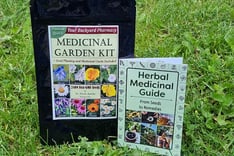Top 5 Medicinal herbs to help lower cholesterol
High cholesterol? Can it be treated with a more natural and medicinal approach? Yes. Let's review 5 natural cholesterol lowering herbs and there uses.
6/13/20243 min read


Top 5 Natural Medicinal Herbs to Lower High LDL Cholesterol
High LDL cholesterol can pose significant risks to your heart health, but natural remedies can help manage and reduce these levels. Here are five medicinal herbs that can assist in lowering high LDL cholesterol, along with how they benefit you and the best ways to use them.
1. Garlic (Allium sativum)
Description: Known for its pungent aroma and flavor, garlic has been a staple in kitchens and medicine cabinets for centuries.
Benefits: Garlic contains allicin, a compound that can lower cholesterol levels by inhibiting its synthesis in the liver. It also supports cardiovascular health by lowering blood pressure and providing antioxidant effects.
How to Use:
• Raw: Crush or chop 1-2 cloves of raw garlic daily and let it sit for a few minutes before consuming to activate the allicin.
• Supplements: Garlic capsules are a convenient alternative if you find the raw form too pungent.
• Cooked: Add garlic to your meals, though keep in mind that raw garlic is more potent.
2. Artichoke Leaf (Cynara scolymus)
Description: Artichoke is more than a delicious vegetable; its leaves are packed with health benefits.
Benefits: Artichoke leaf extract can lower LDL cholesterol while increasing HDL cholesterol. It promotes bile production, aiding in fat digestion and cholesterol excretion, and contains luteolin, an antioxidant.
How to Use:
• Extract: Take 300-600 mg of standardized artichoke leaf extract daily, divided into two or three doses.
• Tea: Brew artichoke leaves in hot water and enjoy the tea once or twice a day.
3. Fenugreek (Trigonella foenum-graecum)
Description: Fenugreek is a versatile herb with a long history in traditional medicine, known for its slightly bitter, nutty flavor.
Benefits: Fenugreek seeds are rich in soluble fiber, which helps lower LDL cholesterol and reduce cholesterol absorption in the intestines. It also helps regulate blood sugar levels.
How to Use:
• Seeds: Soak 1-2 tablespoons of fenugreek seeds in water overnight and consume them on an empty stomach in the morning.
• Powder: Add 1 teaspoon of fenugreek powder to water, juice, or yogurt.
• Supplements: Take fenugreek capsules as directed, typically 500 mg, 2-3 times daily.
4. Turmeric (Curcuma longa)
Description: Famous for its bright yellow color and earthy taste, turmeric is a cornerstone of Ayurvedic medicine.
Benefits: Turmeric contains curcumin, known for its anti-inflammatory and antioxidant properties. Curcumin helps lower LDL cholesterol and may prevent cholesterol oxidation, supporting overall heart health.
How to Use:
• Powder: Add 1-2 teaspoons of turmeric powder to your food, smoothies, or tea, and include black pepper to enhance absorption.
• Supplements: Take curcumin supplements, often combined with piperine, as per the dosage instructions.
• Fresh Root: Use fresh turmeric root in your cooking or brew it in teas.
5. Red Yeast Rice (Monascus purpureus)
Description: A traditional Chinese medicine staple, red yeast rice is rice fermented with a specific type of yeast.
Benefits: Red yeast rice contains monacolin K, which mimics the effects of statin drugs. It effectively lowers LDL cholesterol levels and improves lipid profiles, reducing the risk of cardiovascular events.
How to Use:
• Supplements: Typically, 600-1200 mg of red yeast rice is taken 2-3 times daily.
• Culinary Use: Incorporate red yeast rice into meals, but supplements provide more consistent dosages.
Optimizing Benefits
1. Consistency is Key: Regular, consistent use of these herbs is crucial for lowering cholesterol levels.
2. Consult a Professional: Always talk to a healthcare provider before starting any new herbal regimen, especially if you have existing health conditions or are on medication.
3. Lifestyle Integration: Combine these herbs with a healthy diet, regular exercise, and other lifestyle changes for the best results.
4. Quality Matters: Ensure you source high-quality herbs and supplements from reputable suppliers to avoid contaminants and ensure efficacy.
Incorporating these natural herbs into your daily routine can help you manage your cholesterol levels effectively and boost your overall heart health.


